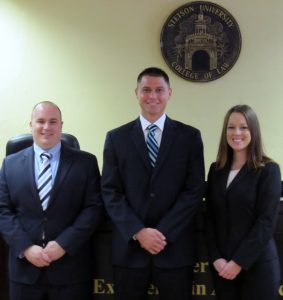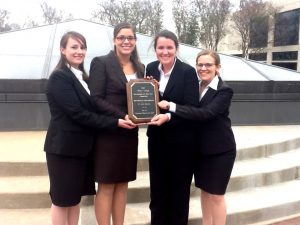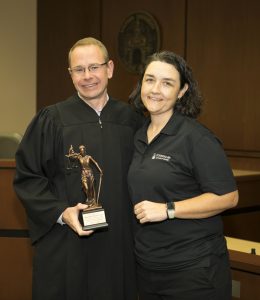Stetson Moot Court alumni return as coaches: Giving back “small fraction of what Stetson gave me”
By Kai Su
Diana Evans, J.D. ’12, and Jason Lambert, B.B.A. ’02, J.D. ’12, both note Stetson’s Moot Court Board as a defining experience during their time studying at the College of Law.
“Moot Court was probably the part of law school I enjoyed the most,” Lambert said, who returned to coaching this year for the Civil Rights and Liberties team, helping the team win the 11th Annual Civil Rights and Liberties Moot Court Competition on Oct. 23. “When I graduated, I knew I wanted to come back and contribute to a program that did a lot for me.”
While on the Board, Lambert competed in a variety of competitions: the Mercer Legal Ethics and Professionalism Competition, two ABA National Appellate Advocacy Competitions, the Robert Orseck Memorial Moot Court Competition, and the Appellate Lawyers Association Moot Court Competition. His teams won the Mercer and Orseck competitions, and his second ABA team made it to the national semifinals.
“The competition problems were all different,” Lambert said, with some of the competition problems resembling real-life, contemporary Supreme Court cases.
Evans competed in the National Veterans Law Moot Court Competition and the Philip C. Jessup International Law Moot Court Competition as a student. Evans, who is coaching the Veterans and Jessup teams in her first year as a coach, expressed a similar sentiment about what motivated her to return. She said she wanted to give back what her coaches gave her.
Former professor, and now judge, Michael Allen coached both Evans and Lambert while they were members of the Moot Court Board. Stetson’s Center for Excellence in Advocacy presented Judge Allen with an award for his support on Oct. 15.
Evans said she appreciated Judge Allen’s laid-back and relaxed approach.
“He’s a very understanding person and always made you feel at ease,” Evans said. “So I would like for myself to be able to adopt a similar approach, and to just be there to support the team and make them feel at ease with me.”
Judge Allen, who recently joined the U.S. Court of Appeals for Veterans Claims in Washington, said to this day, he remains closest with the former students with whom he dealt with on the Moot Court Board. He explained how when he went into teaching, he knew there were aspects he would enjoy, such as spending time in the classroom and writing about stimulating topics.
“Both of those things were true, but I never expected that the most rewarding thing I would do in teaching was coaching Moot Court teams,” Allen said. “Yes, it was ‘fun’ to watch teams win—which they did a lot—but the best thing was seeing how students really understood what they were talking about and grew as people.”
Evans explained the philosophy behind her easy-going, hands-off approach.
“We’re all adults here on the Moot Court Board, and I’m going to treat people like they are adults,” Evans said. “I’m going to do my job, but I want them to be independent too. I think that is a balance you want to strike—between letting team members grow and develop individually while providing enough guidance to help them succeed.”
Lambert sees his role as a coach as enhancing his students’ natural styles and bringing those better parts to the surface. He does not force students into a box because arguments that sound overly contrived or canned are unpersuasive.
“To be successful at Moot Court, I don’t think you can spoon feed someone how to say a certain thing or make a certain argument,” Lambert said. “You have to make it your own to be effective in competition…. My goal is to try to bring out the best ways they can present that, which is also genuine to their presentation style.”
Lambert thinks it is important to return to coach the teams because the difference he often observed between Stetson and other schools at competitions was the quality of their practices. He said that when he was on the board he appreciated the former judges and attorneys who attended his practices because they always provided a different perspective. And now as a coach, Lambert reaches out to friends to attend his team’s practices.
Evans sees moot court as a broad life-based experience, rather than a means to acquire a specific legal skill. She learned useful skills and lessons, such as how to articulate yourself in front of an audience and use team-building skills, which have carried over into her professional practice.
“I’m kind of a shy person, so I found that being on Moot Court and having those opportunities to get up and speak in front of people helped me personally to overcome some of that shyness in my professional life,” she said. “When I know I have a weakness or I know something is a challenge, I like to push myself to overcome it.”
Lambert said there are many aspects of his Moot Court experience that he still draws from today as a commercial litigator.
“Most of what I do involves drafting pleadings that will ultimately end up in court, and then I go to court and argue,” Lambert said. “The vast majority of what I do is similar to what I learned in Moot Court, even if it’s just at the trial court level.”
Lambert said the experiences that still stand out to him today are the amount of preparation required for competitions and the intense training and stamina required to do Moot Court.
“In law school you have no limit on your resources or time, and the number of practices we had really impressed upon me the importance of preparation,” Lambert said. “Moot Court teaches you the skills you need to know to be successful later on when you do have time and budget constraints.”
Lambert recalled how emotionally and mentally exhausting competitions could be after a day of multiple arguments. Earlier this year Lambert had two jury trials that lasted all day, and he said knowing how to pace himself to get through that experience smoothly is important— a practical skill for which Moot Court prepared him.
“You have to have the stamina to go the entire day and be mentally sharp and be prepared for whatever is going to happen next,” Lambert said.
The advice Lambert gives to his students is that they will never have an opportunity like this again in their careers, so take advantage of it. He explained how the Moot Court experience teaches them how to perfect the nuances in their writing and oral arguments.
Evans said the Moot Court experiences that resonate with her today are the relationships she developed with her coaches and teammates. She said things such as learning the law and honing research and writing skills are all valuable, but in the grand scheme of life, the personal relationships are what she values most.
“In some cases I’ve made made friends for life—best friends,” Evans said.
Evans said it is important to come back and coach because it is a cycle, a give and take—and coaching also just seemed like fun.
“I got a lot out of Moot Court. I honestly got a lot out of Stetson,” Evans said. “I think it was a great place that gave me a lot of opportunities, and any way that I can give back some small fraction of what Stetson gave me, I’m willing to do that.”
Evans advises Moot Court students to put in the time and take it seriously, because they will get so much out of the experience. She highlighted the importance of treating teammates with respect and being understanding, because remembering that Moot Court is a team effort will help elevate the experience.
“For me, being on Moot Court was an integral part of my experience at Stetson. It’s something that I look back on very fondly,” Evans said. “I hope Stetson continues to have such a great Moot Court Board and that people come forward and help the team because it is a community, and it’s a community experience.”
Post date: Oct. 24, 2017
Media contact: Kate Bradshaw
[email protected] | 727-430-1580


